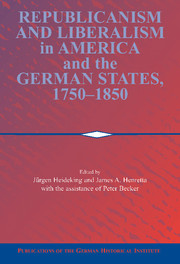Introduction
Published online by Cambridge University Press: 05 January 2013
Summary
Transatlantic comparisons in the period from 1750 to 1850 are often limited to the American and French revolutions, and recent bicentennial celebrations of the Declaration of Independence and the French Revolution have reinforced this tendency. Indeed, these two epochal events are the focal points of what R. R. Palmer has called the “age of democratic revolution” and therefore deserve the closest historical scrutiny. However, there is much to be gained by broadening the perspective in order to view these revolutionary upheavals as part of a continuous transformation of Western society and culture. Moreover, Palmer's concept of a transatlantic “democratic revolution” is widely acknowledged to be flawed because terms such as democratic and democracy do not precisely convey the content and meaning of late-eighteenth-century texts. In fact, as other scholars looked closely at the sources they discovered that the revolutionary mind in America and Europe was deeply affected by republican maxims, principles, and values. Beginning in the 1970s the reconstruction and evaluation of this “republican ideology” became a major task of historians on both sides of the Atlantic. American, British, and French scholars took a leading role in this effort, whereas historians in Germany and other central European countries remained on the sidelines. In Germany the debate on the relationship between republicanism and liberalism, and the crucial importance of these ideologies for understanding the birth of the modern world has only recently begun to inspire research and generate controversy.
To push forward this transcontinental dialog, a German-American conference on “Republicanism and Liberalism in America and the German States, 1750–1850” was convened in 1996. Under the auspices of the German Historical Institute,Washington, D.C., with additional financial support from the Fritz Thyssen Foundation, this conference took place at the University of Wisconsin at Madison on October 3–6, 1996. The task defined for the conference participants was threefold: to take stock of the present state of the debate over the influence of republicanism and liberalism in the revolutionary era; to extend the discussion into the first half of the nineteenth century in order to profit from fascinating new research on subsequent political, social, and cultural developments; and to explore the possibilities of comparative German-American studies, especially in the field of ideas and mentalités, from the late eighteenth to the late nineteenth century. This volume assembles most of the papers delivered at the conference, revised in the light of our discussions.
- Type
- Chapter
- Information
- Publisher: Cambridge University PressPrint publication year: 2002



